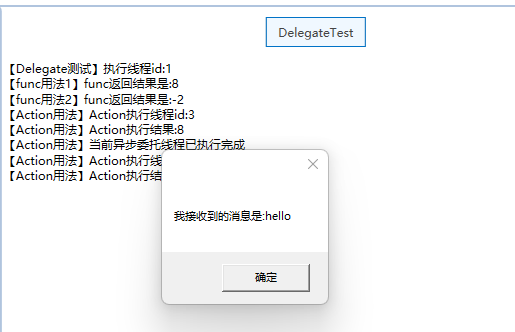概述
事件属于委托的一个子集,像我们平时界面上的鼠标点击按钮后响应事件、事件的发布和订阅等都需要用到委托.通过委托可以很好的实现类之间的解耦好。事件委托EventHandler的函数原型如下:delegate 表示这个个委托,事件委托没有返回值,有两个入参,sender是事件触发的对象,e是一个泛型的事件类型参数.
public delegate void EventHandler<TEventArgs>(object sender, TEventArgs e);用法举例
用法举例1:窗体关闭事件
public void Cancel(object obj, bool e){if (e){sw.AppendLine("try clsoe window");}else{sw.AppendLine("clsoe window is cancel");}}
//事件委托1,事件是委托的子集EventHandler<bool> windowTryClose = Cancel;windowTryClose(this, false);
这里在定义了一个委托EventHandler<bool>,将方法Cancel委托给他,然后嗲用委托执行。
注意:EventHandler<bool> windowTryClose = Cancel;是EventHandler<bool> windowTryClose = new EventHandler<bool>(Cancel);的简写
传入的参数是false,所以运行结果:
clsoe window is cancel
用法举例2 :按钮点击事件
//事件委托2Button button = new Button();button.ClickEvent += Button_Click;button.ClickAction();
public void Button_Click(Object sender, EventArgs args){sw.AppendLine("这是按钮点击事件");}
public class Button{public EventHandler ClickEvent;public void ClickAction(){ClickEvent.Invoke(this, new EventArgs());}}
这里主要是写了按钮点击事件的一个委托,一般在定义事件委托时前面可以用event去修饰,我这里省略了,
用法举例3 :事件发布与订阅
//事件委托3var myPublishEventArgs = new PublishEvent();_ = new SubscribeEvent(myPublishEventArgs);myPublishEventArgs.Publish();
public class MyPublishEventArgs : EventArgs{public string InfoString { get; set; }}public class PublishEvent{public event EventHandler<MyPublishEventArgs> OnPublish;public void Publish(){OnPublish?.Invoke(this, new MyPublishEventArgs() { InfoString = "hello" });}}public class SubscribeEvent{public SubscribeEvent(PublishEvent publishEvent){publishEvent.OnPublish += Subscribe;}public void Subscribe(Object sender, MyPublishEventArgs args){MessageBox.Show($"我接收到的消息是:{args.InfoString}");}}
这里封装了几个类,MyPublishEventArgs是我要发送的事件,MyPublishEventArgs这个类是发布者,SubscribeEvent这个是订阅者,主要订阅事件一定要放在发布前,这样才能成功接收到事件.
委托部分这里就讲解完事了,全部源码如下:
using PropertyChanged;using System;using System.Text;using System.Threading;using System.Windows;namespace Caliburn.Micro.Hello.ViewModels{[AddINotifyPropertyChangedInterface]public class DelegateViewModel : Screen,IViewModel{public string ResultString { get; set; }delegate int DelegateM(string a, string b);//声明,可以有返回值也可以没有StringBuilder sw = new StringBuilder();public DelegateViewModel(){DisplayName = "DelegateTest";}public void Test(){sw.AppendLine($"【Delegate测试】执行线程id:{Thread.CurrentThread.ManagedThreadId}");//func用法1//Func<string, string, int> func = new Func<string, string, int>(p.StringAddA);Func<string, string, int> func = StringAddA;//简写var result = func.Invoke("3", "5");//可以简化为func("3", "5")sw.AppendLine($"【func用法1】func返回结果是:{result}");//func用法2,用lamda表达式简化写法,通过+=注册实现多播委托func += (a, b) =>{return int.Parse(a) - int.Parse(b);};sw.AppendLine($"【func用法2】func返回结果是:{func("3", "5")}");//Action用法//Action<string, string> action = new Action<string, string>(p.StringAddB);Action<string, string> action = StringAddB;//简写IAsyncResult asyncResult = action.BeginInvoke("3", "5", null, null);//action("3", "5"),BeginInvoke异步执行,即:开启新现成处理StringAddBaction.EndInvoke(asyncResult);//阻塞委托,直到执行完成if (asyncResult.IsCompleted){sw.AppendLine($"【Action用法】当前异步委托线程已执行完成");}Test(func, action);//将方法委托后转化为参数进行传递//delegate用法//DelegateM delegateM = new DelegateM(p.StringAddA);DelegateM delegateM = StringAddA;//简写sw.AppendLine($"【delegate用法】delegate返回结果是:{delegateM("3", "5")}");//事件委托1,事件是委托的子集EventHandler<bool> windowTryClose = new EventHandler<bool>(Cancel);windowTryClose(this, false);//事件委托2Button button = new Button();button.ClickEvent += Button_Click;button.ClickAction();//事件委托3var myPublishEventArgs = new PublishEvent();_ = new SubscribeEvent(myPublishEventArgs);myPublishEventArgs.Publish();ResultString = sw.ToString();}public int StringAddA(string a, string b){return int.Parse(a) + int.Parse(b);}public void StringAddB(string a, string b){sw.AppendLine($"【Action用法】Action执行线程id:{Thread.CurrentThread.ManagedThreadId}");sw.AppendLine($"【Action用法】Action执行结果:{(int.Parse(a) + int.Parse(b))}");}public void Test(Func<string, string, int> f, Action<string, string> a){a.Invoke(f.Invoke("3", "5").ToString(), "5");}public void Cancel(object obj, bool e){if (e){sw.AppendLine("try clsoe window");}else{sw.AppendLine("clsoe window is cancel");}}public void Button_Click(Object sender, EventArgs args){sw.AppendLine("这是按钮点击事件");}public void MyEvent(Object sender, EventArgs args){sw.AppendLine("这是按钮点击事件");}}public class Button{public EventHandler ClickEvent;public void ClickAction(){ClickEvent.Invoke(this, new EventArgs());}}public class MyPublishEventArgs : EventArgs{public string InfoString { get; set; }}public class PublishEvent{public event EventHandler<MyPublishEventArgs> OnPublish;public void Publish(){OnPublish?.Invoke(this, new MyPublishEventArgs() { InfoString = "hello" });}}public class SubscribeEvent{public SubscribeEvent(PublishEvent publishEvent){publishEvent.OnPublish += Subscribe;}public void Subscribe(Object sender, MyPublishEventArgs args){MessageBox.Show($"我接收到的消息是:{args.InfoString}");}}}
运行结果:

